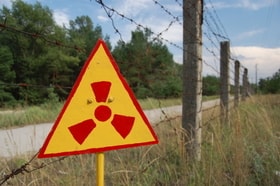
We all know that radiation isn?t safe by any means – and according to the BEIR VII report, even low doses of it can be damaging. What this means is that some everyday activities possess a potential danger of damaging radiation, such as:
Flying in an airplane at high altitudes. The protective effect of the atmosphere is at its lowest point here and you may get more radiation than you are supposed to.
X-Ray machines and nuclear medicine procedures, airport scanners, etc.
Industrial radiography.
Nuclear plant radiation or radioactive contamination, and fallout from damaged reactors.
Uranium mining.
Eating food, even uncontaminated (It is called the ?Banana Equivalent Dose?, informally defined as the additional dose of radiation a person will absorb from eating one banana).
But if radiation is a part of our life, why is it so damaging? Without knowing why, you really can?t protect yourself properly. Scientists were looking for different explanations, but couldn?t find anything credible — then they got lucky. In 1956, scientists were trying to find out if radioactive exposure could sterilize canned food by killing all of the bacteria present. And kill the bacteria it did, except for one: ?Deinococcus Radiodurans?. The microorganism?s resistance to radiation was a mystery. Eventually, it was discovered that this microbe was indeed damaged by the radiation, but could repair its DNA so fast that no damage was done to the cell.
But the question was, how is this possible? As it turns out, this bacterium has an unusually high concentration of enzymes (Superoxide Dismutase and Catalase) which simply de-activate free radicals. Since this discovery, it became apparent what was going on. The proposed mechanism is ?free radical formation?: radiation creates small particles in our bodies which attack the main source of information — DNA. The human body is still capable of repairing itself, but should your body and immune system be either exhausted or overwhelmed ? you could be in trouble. Your DNA will be damaged and send the wrong signals to your body. A frightening possibility, but is there a solution? Sure.
Here are several strategies that may help:
Reduce the time of radiation exposure. For example, if you are in the contaminated zone, get out of it ASAP.
Distance. The further you are, the less exposure you will have.
Shield yourself by using protective devices. For example, if you need x-rays, protect your sexual organs with protective clothing.
Minimize the utilization of radioactive particles by your body. For example, take iodine supplements to protect yourself from radioactive iodine.
Introduce antioxidants! They will help your body deactivate free radicals, caused by radiation.
What to take if exposed:
Potassium iodide to prevent radioactive iodine from becoming incorporated into your thyroid.
Trace elements like zinc and manganese, because Superoxide Dismutase and catalase cannot work without them.
Soy products. Preferably fermented as the isoflavones ?Genistein? and ?Bowman ? Birk? inhibitor from soy has been shown to be radio-protective.
Curcumin from turmeric because of its antioxidant activity.
Melatonin, Glutathione, Vitamin C and E from food, as well as N Acetil Cysteine may protect you from radiation.
Other foods like garlic, ginger and ginseng are also useful
. References: 1. http://www.ieer.org/comments/beir/beir7pressrel.html 2. http://en.wikipedia.org/wiki/Banana_equivalent_dose 3. http://www.google.com/#sclient=psy&hl=en&source=hp&q=deinococcus+radiodurans+SOD+catalase&pbx=1&oq=deinococcus+radiodurans+SOD+catalase&aq=f&aqi=&aql=&gs_sm=e&gs_upl=1739l6931l3l7173l13l12l0l0l0l0l401l1916l4.5.2.0.1l12l0&bav=on.2,or.r_gc.r_pw.&fp=9e80578f3bb9638a&biw=1440&bih=787 4. http://en.wikipedia.org/wiki/Antioxidant

